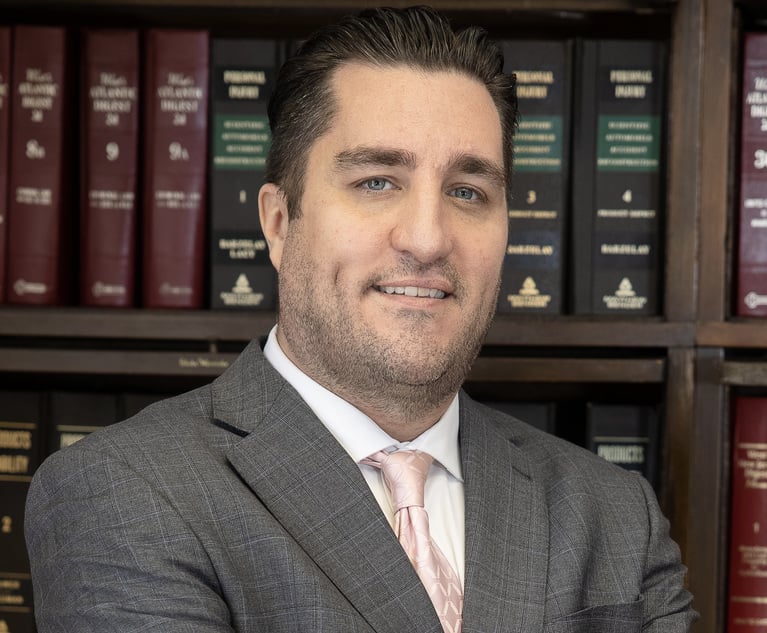In a Round World
OP-ED: When it comes to Municipal Courts, the perfect is the enemy of the good. The world is not perfect; it is an oblate spheroid, which is sort of kind of round.
November 27, 2017 at 01:48 PM
9 minute read

I write in response to the commentary “In a Perfect World” (NJLJ, Nov. 13, 2017), written by my friend and fellow long-suffering municipal court practitioner. When I was asked to serve on the NJSBA's Subcommittee on Judicial Independence in the Municipal Courts, I agreed on one condition. That condition was that this would not be just another report that got laid in a drawer only to have the dust blown off of it when the next study report was laid on top of it. What were then known as the “Inferior Courts” have been studied ad nausea and their deficiencies are widely known. The subcommittee had reports going back before the 1947 Constitution. Recommendations for sweeping change teem and are scrupulously ignored.
That prior article first asserts, “[T]hese courts were created in 1947 and for the most part remain intact and unchanged.” I was not around in 1947, but in 1965 when I was sworn in, the municipal court was enormously different. Some towns rolled out the fire trucks every month and set up a card table for the judge. Municipal courts would go on way past midnight. Once you started a case, you tried it until it was over. Stories abound (probably apocryphal) of lawyers getting home with only enough time to shower and change before reporting to the Superior Court in the morning. I remember before the Breathalyzer. Every police department had a Police Surgeon who agreed to be awakened in the wee hours of the morning in order to administer psychophysical tests to a driver and pronounce him drunk. An appeal to the then County Court was not de novo on the record; it was a new trial. There was no record. If you wanted a record you hired your own court reporter. Those who think nothing has changed lack historical perspective.
A major impediment to the rectification of the shortcomings of the Municipal Courts is the lack of political will in the legislature to force the municipality to cede the coveted judicial appointment power. A radical solution, not involving legislative action, is needed. Unlike the legislature, the Supreme Court — immune to the pressure of the League of Municipalities and sensitive to the criticism leveled at the Municipal Court — might risk acting to remedy this deficiency. The rule proposed below is our attempt to offer the court that opportunity. There is precedent for this type of solution. Municipal Court administrators, deputy court administrators and Municipal Court directors who were once hired exclusively by the municipality, are now subject to the approval of the assignment judge. We should extend that same thinking to the judge. And, who knows, when confronted with the prospect of such a rule, perhaps the legislature will be spurred to action.
Court Rule
No attorney may serve as a Municipal Court Judge unless the Assignment Judge of the vicinage has confirmed that appointment. In the confirmation process the Assignment Judge shall consider the finding of qualified or unqualified of the Due Diligence Committee of the County Bar Association as well as the input of the Assignment Judge's Review Committee. The Assignment Judge's Review Committee shall include the Presiding Municipal Court Judge, the Municipal Court Division Manager, and others in the discretion of the Assignment Judge.
Comment
The rule leaves the power of the Municipality to appoint its Municipal Court Judge intact. It prohibits any attorney (whose conduct is governed by the Rules of Court) from serving as a Municipal Court Judge without the approval of the Assignment Judge in the vicinage in which the Municipal Court is located.
The prior article does a good job of describing the process embodied in the above rule, and then goes on to argue that improving something is somehow the wrong thing to do. He allows, “This is not to say that the proposed changes will not work.” His caveat is, “My concern is that a tweaked system with serious flaws, remains a seriously flawed system.” He concludes, “In a perverse way, they would almost provide a reason to keep the present Municipal Court system in place, with the mistaken belief that the problems with independence in the Municipal Courts have been resolved with these changes.”
The perfect really is the enemy of the good. The world is not perfect; it is an oblate spheroid, which is sort of kind of round.
Fishman is a partner with Fishman & Fishman in Lawnside, focusing his practice on workers' compensation, personal injury, and drunk driving defense.

I write in response to the commentary “In a Perfect World” (NJLJ, Nov. 13, 2017), written by my friend and fellow long-suffering municipal court practitioner. When I was asked to serve on the NJSBA's Subcommittee on Judicial Independence in the Municipal Courts, I agreed on one condition. That condition was that this would not be just another report that got laid in a drawer only to have the dust blown off of it when the next study report was laid on top of it. What were then known as the “Inferior Courts” have been studied ad nausea and their deficiencies are widely known. The subcommittee had reports going back before the 1947 Constitution. Recommendations for sweeping change teem and are scrupulously ignored.
That prior article first asserts, “[T]hese courts were created in 1947 and for the most part remain intact and unchanged.” I was not around in 1947, but in 1965 when I was sworn in, the municipal court was enormously different. Some towns rolled out the fire trucks every month and set up a card table for the judge. Municipal courts would go on way past midnight. Once you started a case, you tried it until it was over. Stories abound (probably apocryphal) of lawyers getting home with only enough time to shower and change before reporting to the Superior Court in the morning. I remember before the Breathalyzer. Every police department had a Police Surgeon who agreed to be awakened in the wee hours of the morning in order to administer psychophysical tests to a driver and pronounce him drunk. An appeal to the then County Court was not de novo on the record; it was a new trial. There was no record. If you wanted a record you hired your own court reporter. Those who think nothing has changed lack historical perspective.
A major impediment to the rectification of the shortcomings of the Municipal Courts is the lack of political will in the legislature to force the municipality to cede the coveted judicial appointment power. A radical solution, not involving legislative action, is needed. Unlike the legislature, the Supreme Court — immune to the pressure of the League of Municipalities and sensitive to the criticism leveled at the Municipal Court — might risk acting to remedy this deficiency. The rule proposed below is our attempt to offer the court that opportunity. There is precedent for this type of solution. Municipal Court administrators, deputy court administrators and Municipal Court directors who were once hired exclusively by the municipality, are now subject to the approval of the assignment judge. We should extend that same thinking to the judge. And, who knows, when confronted with the prospect of such a rule, perhaps the legislature will be spurred to action.
Court Rule
No attorney may serve as a Municipal Court Judge unless the Assignment Judge of the vicinage has confirmed that appointment. In the confirmation process the Assignment Judge shall consider the finding of qualified or unqualified of the Due Diligence Committee of the County Bar Association as well as the input of the Assignment Judge's Review Committee. The Assignment Judge's Review Committee shall include the Presiding Municipal Court Judge, the Municipal Court Division Manager, and others in the discretion of the Assignment Judge.
Comment
The rule leaves the power of the Municipality to appoint its Municipal Court Judge intact. It prohibits any attorney (whose conduct is governed by the Rules of Court) from serving as a Municipal Court Judge without the approval of the Assignment Judge in the vicinage in which the Municipal Court is located.
The prior article does a good job of describing the process embodied in the above rule, and then goes on to argue that improving something is somehow the wrong thing to do. He allows, “This is not to say that the proposed changes will not work.” His caveat is, “My concern is that a tweaked system with serious flaws, remains a seriously flawed system.” He concludes, “In a perverse way, they would almost provide a reason to keep the present Municipal Court system in place, with the mistaken belief that the problems with independence in the Municipal Courts have been resolved with these changes.”
The perfect really is the enemy of the good. The world is not perfect; it is an oblate spheroid, which is sort of kind of round.
Fishman is a partner with Fishman & Fishman in Lawnside, focusing his practice on workers' compensation, personal injury, and drunk driving defense.
This content has been archived. It is available through our partners, LexisNexis® and Bloomberg Law.
To view this content, please continue to their sites.
Not a Lexis Subscriber?
Subscribe Now
Not a Bloomberg Law Subscriber?
Subscribe Now
NOT FOR REPRINT
© 2025 ALM Global, LLC, All Rights Reserved. Request academic re-use from www.copyright.com. All other uses, submit a request to [email protected]. For more information visit Asset & Logo Licensing.
You Might Like
View All
Appellate Division Rejects Third Circuit Interpretation of NJ Law, Says No Arbitration for Insurance Fraud
4 minute read

'Go 12 Rounds' or Settle: Rear-End Collision Leads to $2.25M Presuit Settlement

'Point Us to the Plain Language': NJ Supreme Court Grills Defense Statutory Requirements for Affidavit of Merit
5 minute readTrending Stories
- 1Meta Hires Litigation Strategy Chief, Tapping King & Spalding Partner Who Was Senior DOJ Official in First Trump Term
- 2Courts Beginning to Set Standards for Evidence Relying upon Artificial Intelligence
- 3First-Degree Murder Charge May Not Fit Mangione Case
- 4Legal Tech's Predictions for Legal Ops & In-House in 2025
- 5SDNY US Attorney Damian Williams Lands at Paul Weiss
Who Got The Work
Michael G. Bongiorno, Andrew Scott Dulberg and Elizabeth E. Driscoll from Wilmer Cutler Pickering Hale and Dorr have stepped in to represent Symbotic Inc., an A.I.-enabled technology platform that focuses on increasing supply chain efficiency, and other defendants in a pending shareholder derivative lawsuit. The case, filed Oct. 2 in Massachusetts District Court by the Brown Law Firm on behalf of Stephen Austen, accuses certain officers and directors of misleading investors in regard to Symbotic's potential for margin growth by failing to disclose that the company was not equipped to timely deploy its systems or manage expenses through project delays. The case, assigned to U.S. District Judge Nathaniel M. Gorton, is 1:24-cv-12522, Austen v. Cohen et al.
Who Got The Work
Edmund Polubinski and Marie Killmond of Davis Polk & Wardwell have entered appearances for data platform software development company MongoDB and other defendants in a pending shareholder derivative lawsuit. The action, filed Oct. 7 in New York Southern District Court by the Brown Law Firm, accuses the company's directors and/or officers of falsely expressing confidence in the company’s restructuring of its sales incentive plan and downplaying the severity of decreases in its upfront commitments. The case is 1:24-cv-07594, Roy v. Ittycheria et al.
Who Got The Work
Amy O. Bruchs and Kurt F. Ellison of Michael Best & Friedrich have entered appearances for Epic Systems Corp. in a pending employment discrimination lawsuit. The suit was filed Sept. 7 in Wisconsin Western District Court by Levine Eisberner LLC and Siri & Glimstad on behalf of a project manager who claims that he was wrongfully terminated after applying for a religious exemption to the defendant's COVID-19 vaccine mandate. The case, assigned to U.S. Magistrate Judge Anita Marie Boor, is 3:24-cv-00630, Secker, Nathan v. Epic Systems Corporation.
Who Got The Work
David X. Sullivan, Thomas J. Finn and Gregory A. Hall from McCarter & English have entered appearances for Sunrun Installation Services in a pending civil rights lawsuit. The complaint was filed Sept. 4 in Connecticut District Court by attorney Robert M. Berke on behalf of former employee George Edward Steins, who was arrested and charged with employing an unregistered home improvement salesperson. The complaint alleges that had Sunrun informed the Connecticut Department of Consumer Protection that the plaintiff's employment had ended in 2017 and that he no longer held Sunrun's home improvement contractor license, he would not have been hit with charges, which were dismissed in May 2024. The case, assigned to U.S. District Judge Jeffrey A. Meyer, is 3:24-cv-01423, Steins v. Sunrun, Inc. et al.
Who Got The Work
Greenberg Traurig shareholder Joshua L. Raskin has entered an appearance for boohoo.com UK Ltd. in a pending patent infringement lawsuit. The suit, filed Sept. 3 in Texas Eastern District Court by Rozier Hardt McDonough on behalf of Alto Dynamics, asserts five patents related to an online shopping platform. The case, assigned to U.S. District Judge Rodney Gilstrap, is 2:24-cv-00719, Alto Dynamics, LLC v. boohoo.com UK Limited.
Featured Firms
Law Offices of Gary Martin Hays & Associates, P.C.
(470) 294-1674
Law Offices of Mark E. Salomone
(857) 444-6468
Smith & Hassler
(713) 739-1250






